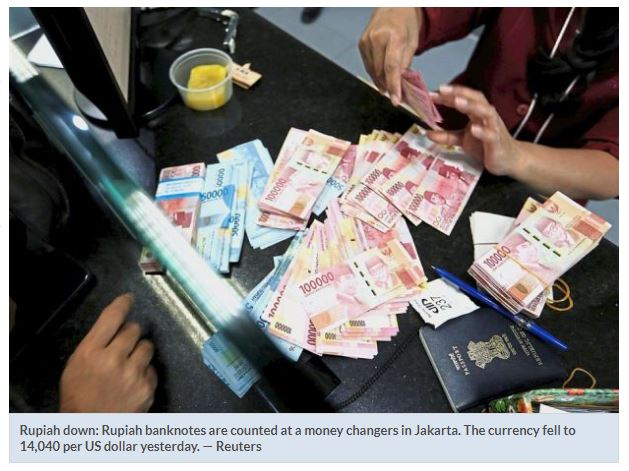Indonesia market still down
SINGAPORE: Indonesia’s market rout shows no signs of abating, with its two-year bonds the latest to be dumped in anticipation that the central bank may need to raise rates to defend its currency.
The yield on the two-year debt soared 25 basis points to 6.63%, set for its highest close in 10 months as the currency weakened past the psychological 14,000 level on Monday. The stock index has tumbled to its lowest since August.
The selldown has Bank Indonesia (BI) caught between mounting pressure to raise rates and an economy that isn’t growing fast enough. An emerging market rout that started as US Treasury yields touched a four-year high last month has hurt the South-East Asia nation given its relatively open economy and high foreign ownership of its assets.
“There seems to be an increase in market anxiety after the rupiah breached the 14,000 threshold,” said Winson Phoon, head of fixed-income research at Maybank Kim Eng Securities Pte in Singapore. “BI is expected to continue to take measures to stabilise the financial market, and raising rate is one of the tools at their disposal. The bond market may be pricing in such an eventuality.”
The rupiah fell 0.3% to 14,040 per US dollar at 11:44 am in Jakarta, after touching 14,047, the weakest since December 2015. The 10-year bond yield also rose 12 basis points to 7.27%. Dollar bonds of Indonesia’s state-owned entities were sold off as well, with oil producer PT Pertamina’s 2044 notes down 1.7 cents to 106.6 cents.
Foreign investors have sold a net US$1.1bil of sovereign bonds last month, on top of US$2.7bil of stocks this year, data compiled by Bloomberg show. Foreign investors hold around 38.4% of local-currency bonds.
“As global investors become more cognizant of rising US rates and dollar strength, there would be pressures on EM yields including Indonesia,” said Eugene Leow, a fixed-income strategist at DBS Group Holdings Ltd in Singapore.
Bank Indonesia governor Agus Martowardojo has said he will ensure ample liquidity of currencies to ease volatility, after repeated intervention on the rupiah. The central bank has also stepped up buying of sovereign bonds from the secondary market.
Indonesia isn’t alone in contending with investors who have turned cold. Debt sales from countries such as Russia have been cancelled or postponed, while Argentina’s central bank has raised interest rates three times in a week to halt a currency slide.
“We just need to watch the rupiah by learning from the experience of Argentina,” Jeffrosenberg Tan, head of investment strategy at PT Sinarmas Sekuritas, said in Jakarta. “The stock market at this point is hoping for BI to raise the rates to stabilise the exchange rate.”
Indonesia’s benchmark index has dropped 9.4% this year, and is the second worst-performing major equity market in Asia. Any interest rate increase will also need to take into the consideration the sluggish economy. Growth in the first quarter at 5.06% missed estimates by economists.
Traders will be watching two events. The government is selling five-, 15- and 20-year government bonds, while reserves data will be scrutinised to determine what’s left in Bank Indonesia’s war chest.
Investors will probably be cautious at the auctions owing to a strengthening dollar, and yields have room to keep rising, according to Deutsche Bank AG. The nation’s reserves have slid US$5.9bil in the two months through March 31 to US$126bil. — Bloomberg
Source: https://www.thestar.com.my/business/business-news/2018/05/09/indonesia-market-still-down/#wqsK1pqgEpTScArA.99


 English
English




